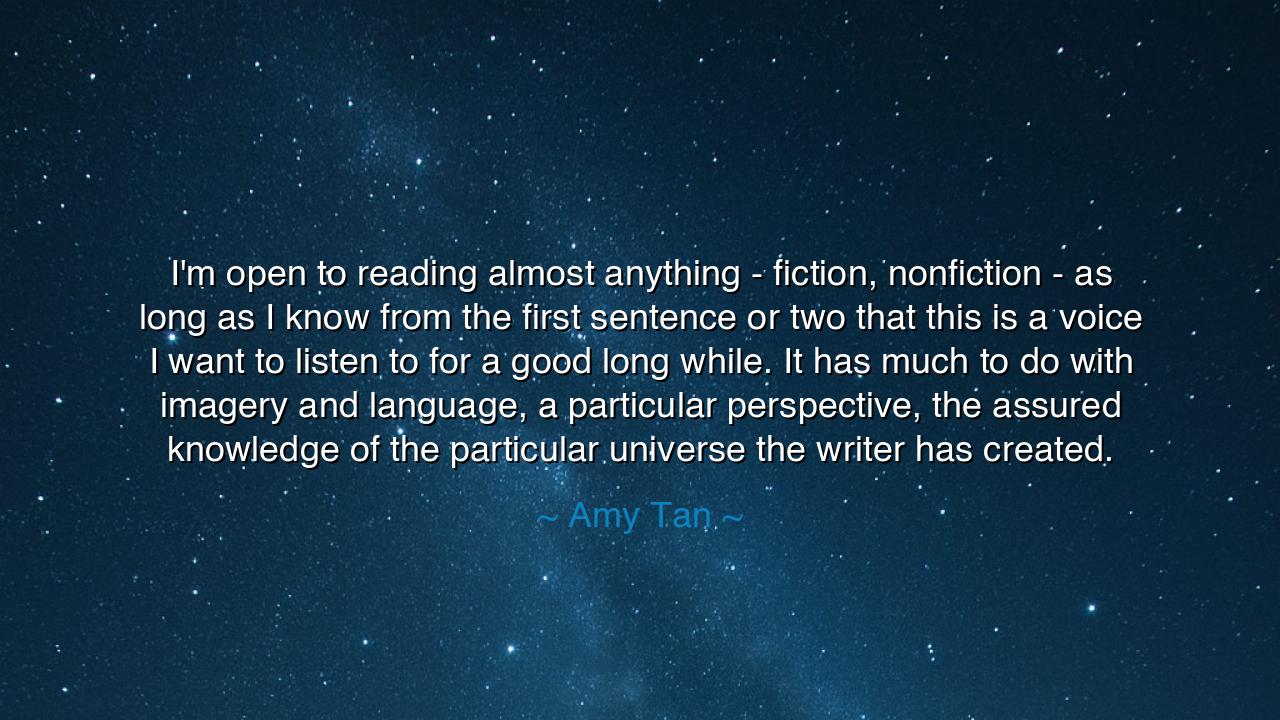
I'm open to reading almost anything - fiction, nonfiction - as
I'm open to reading almost anything - fiction, nonfiction - as long as I know from the first sentence or two that this is a voice I want to listen to for a good long while. It has much to do with imagery and language, a particular perspective, the assured knowledge of the particular universe the writer has created.






In the words of Amy Tan: “I’m open to reading almost anything—fiction, nonfiction—as long as I know from the first sentence or two that this is a voice I want to listen to for a good long while. It has much to do with imagery and language, a particular perspective, the assured knowledge of the particular universe the writer has created.” These words are not merely about the act of reading, but about the profound bond between soul and story, between the seeker and the guide who dares to speak. For in every age, humanity has turned its ear toward voices that resonate with truth, beauty, and conviction. A tale is not only what is told—it is how it is told, and whether it carries the power to hold our hearts for the long journey.
The ancients themselves believed in the sacred power of voice. The bards of Greece sang their epics not upon parchment but into the air, knowing that only a living language filled with rhythm and imagery could carry their listeners into worlds unseen. Homer’s Iliad did not live because of the battles alone, but because his voice painted fire upon the battlefield, sorrow upon the faces of kings, and immortality upon the deeds of mortals. A weak voice fades; a strong voice endures beyond centuries.
Amy Tan speaks of that moment when the first sentence declares itself—not as words upon a page, but as a doorway into a universe. Consider the beginning of Tolstoy’s Anna Karenina: “All happy families are alike; each unhappy family is unhappy in its own way.” At once, the reader feels the weight of truth and the promise of deep exploration. One sentence becomes the bridge into a vast cosmos of human joy and sorrow. In this way, we see that the voice of a writer is not mere ornament but the key that unlocks the entire journey.
History offers us examples of how perspective shapes not only stories but civilizations. When the enslaved writer Olaudah Equiano penned his narrative, he did more than recount a life; he gave voice to a people silenced by chains. His language, vivid with the pain and dignity of experience, altered the conscience of nations and fueled the fire of abolition. This is the power of a writer assured of their universe: they command us to listen, and in listening, we are transformed.
Yet let us not mistake Tan’s wisdom as meant for books alone. Each of us, in our daily lives, is also a teller of stories. Our words, our tone, our chosen imagery, create the world others step into when they encounter us. A careless voice builds distrust, but a voice of clarity, kindness, and conviction draws others near, eager to remain for the “good long while.” Thus, the teaching extends beyond the page: we are all authors of the universes we create through speech and deed.
The lesson is clear: cultivate your voice. When you speak, let your language carry weight, let your perspective be honest, let your imagery open windows rather than close doors. And when you read or listen, seek those voices that are rich with truth, beauty, and a sure command of their world, for they will nourish your spirit and expand your own vision. As a farmer knows the quality of soil by its first touch, so too can we know the worth of a story from its first breath.
Therefore, O seeker, heed this wisdom: do not waste your hours upon voices that ring hollow. Seek those that awaken wonder, challenge the heart, or comfort the weary soul. And in your own life, strive to be such a voice for others. For just as Amy Tan reminds us, the opening words carry within them the entire promise of a universe—and when that promise is true, we are willing to follow for a lifetime.






AAdministratorAdministrator
Welcome, honored guests. Please leave a comment, we will respond soon